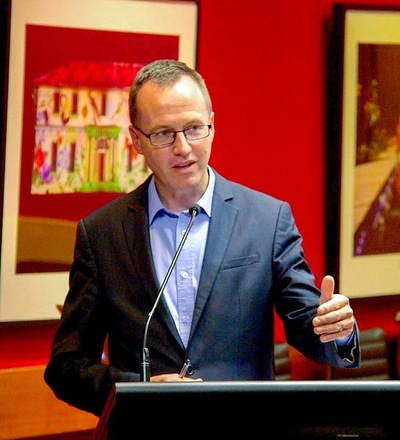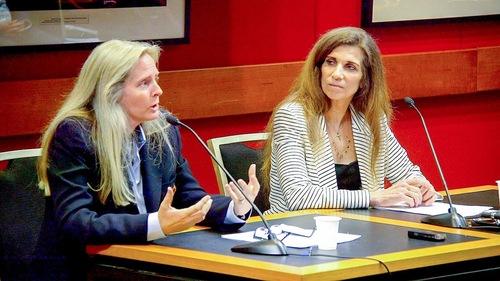Australia: Documentary “Hard to Believe” Inspires Discussion of Global Moral Responsibility
(Minghui.org) The documentary “Hard to Believe,” which was screened in the New South Wales State Parliament House on October 28, 2015, inspired a discussion of moral responsibility among the academics (professors from a variety of universities in Sydney), medical doctors, transplant professionals, and lawyers present.
The documentary is an investigation of a lucrative but vile business in China, where the government-controlled judicial system, prisons, forced labor facilities, military hospitals, and medical doctors created a network to harvest organs from living Falun Gong practitioners to sell to transplant patients, essentially "killing on demand."
The Australian organization "Lawyers for Human Rights" endorsed the screening in the State Parliament House. Member of Parliament the Honorable David Shoebridge from the Green Party presided over the discussion afterward.
Author and investigative journalist Ethan Gutmann participated in the discussion via video conferencing.
 MP of New South Wales David Shoebridge
MP of New South Wales David Shoebridge
 Transplant Ethicist and Bond University Professor Ms. Katrina Bramstedt (left) and Ms. Maria Fiatarone Singh, MD, Sydney University Professor and member of the Medical Consulting Committee of Doctors Against Forced Organ Harvesting.
Transplant Ethicist and Bond University Professor Ms. Katrina Bramstedt (left) and Ms. Maria Fiatarone Singh, MD, Sydney University Professor and member of the Medical Consulting Committee of Doctors Against Forced Organ Harvesting.
For Nathan Kennedy, President of Australian Lawyers for Human Rights, merely balancing the supply and demand of organs in Australia will not solve the severe human rights violations for thousands of prisoners of conscience in China. He believes the world should intervene in China, because “we can't simply ignore it” because (forced organ harvesting) is an ongoing issue that we must “deal with,” “investigate,” and “stop.”
Author and investigative journalist Mr. Ethan Gutmann was a reporter in Beijing when Jiang Zemin initiated the persecution of Falun Gong in 1999. He witnessed both the popularity of Falun Gong before the persecution started and the brutality of the persecution.
When forced organ harvesting in China hit the news in 2006, he started a 5-year-long investigation that included field visits and numerous interviews of those involved. In his book Slaughter, he estimated that about 65,000 Falun Gong practitioners were murdered for their organs and emphasized that it is still going on in China.
New South Wales MP Mr. Shoebridge noted that the Chinese Consulate had threatened Members of Parliament not to attend a briefing on the international human organ trade at Parliament House two months ago.
The briefing was tasked with urging Parliament to amend an existing law to forbid any unethical overseas organ transplants.
President of New South Wales Legislative Council Mr. Don Harwin received a letter from the Chinese consul a day before the event, saying that such a meeting would "damage economic cooperation between two nations."
World renowned transplant ethicist and professor at Bond University Ms. Katrina Bramstedt explained the conflict between transplants and forced organ harvesting. She said that organ transplantation is a medical miracle based on organ donation, which is a “gift of life,” and not an organ torn from an unwilling victim doomed to death.
She commented that Chinese government officials never express any shame over forced organ harvesting, because they have a different moral system from the rest of world.
Professor Bramstedt is concerned that a desperate patient might make an unethical decision to save his or her life. She also cautioned fellow doctors: “We must do no harm.”
Sydney University Professor and member of the Medical Consulting Committee of Doctors Against Forced Organ Harvesting Maria Fiatarone Singh, MD, added that Australia is partly responsible for the current situation in China, because hundreds of Chinese medical doctors who learned to transplant organs in Australia set up the system after they returned home. She urged the public to uphold justice “for these victim's families, because they are our neighbors” and it is our duty to protect them as we would protect ourselves.